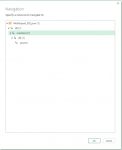Just came back to this after working on other things (& failing to get anywhere... sigh!)
Here's another thread that looks interesting
http://www.accessforums.net/showthread.php?t=62671
Haven't checked whether it's the same as the stackoverflow link quoted earlier
The OP got a long way but stopped. I haven't tried his approach
I also saw the link that CJ_London posted but got put off by the comment that the
approach makes the system vulnerable in some cases, since it allows the direct access to the drives (and other stuff) for the malicious JS code via ActiveX's.
Whilst the author later qualified that comment, I figured I wasn't knowledgeable enough to deal with that and left it alone...
Just for the record, I find both StackOverflow & ExpertsExchange really difficult to follow up posts or query accepted answers.
It sometimes feels like both are 'closed shops'
For now, I still wonder if the approach I outlined in
post #13 using Excel as an intermediary is the best way forward.
I've used it on 20+ JSON files & its worked in every single case with almost no effort.
I would really recommend others try it.
My thinking is that it may be possible to use automation to run the JSON import into Excel from Access and then import into Access itself



